Testing The Temperature 8
What do voters in Northern Ireland think about the Protocol on Ireland/Northern Ireland / Windsor Framework?
David Phinnemore, Katy Hayward and Lisa Claire Whitten [1]
June 2023
The report is available to download here:
Executive Summary
- The adoption of the Windsor Framework has resulted in a warming of opinion of voters in Northern Ireland to the Protocol on Ireland/Northern Ireland. The ‘warming’ has come primarily from among voters identifying as ‘slightly unionist’. A sizeable minority – comprising primarily ‘strong unionists’ – remains hostile to the arrangements.
- 61% see the Protocol with the Windsor Framework as an appropriate means for managing the effects of Brexit on Northern Ireland (up from 53% in our previous poll in early February 2023). 56% regard the Protocol/Windsor Framework as overall ‘a good thing for Northern Ireland’.
- 34% disagree that overall the Protocol/Windsor Framework is ‘a good thing for Northern Ireland’; the lowest recorded level in eight polls and down from 41% in February 2023. Equally, 34% disagree that it is an appropriate means of managing the effects of Brexit on Northern Ireland.
- Almost three quarters of respondents (73%) believe that particular arrangements for Northern Ireland are necessary to manage the impact of Brexit.
- More than 6 in 10 respondents (62%) do not think that Brexit is overall ‘a good thing’ for the United Kingdom. The same proportion of respondents (62%) believe the United Kingdom was wrong to leave the European Union.
- Views on the political impact of the Protocol have become slightly more positive since the Windsor Framework, but the most positive views are on its economic consequences.
- 54% think the Protocol/Windsor Framework is having a positive impact on the Northern Ireland economy, and 68% think it offers unique opportunities that could benefit Northern Ireland.
- 47% of voters in Northern Ireland have concerns about the full operational scope and impact of the Protocol with the Windsor Framework; this is down from 58% in February 2023.
- The Windsor Framework has changed voters’ views on the impact of the Protocol on British-Irish relations (43% seeing it as positive; 35% as negative – down from 58% in February 2023) and UK-EU relations (49% positive; 32% negative – down from 57% in February 2023).
- An equal proportion of respondents – 40% – view the Protocol/Windsor Framework’s impact on Northern Ireland’s place in the UK internal market as positive (up from 28% in February 2023) and negative (down from 48%).
- There are mixed levels of trust/distrust in political actors and institutions when it comes to managing Northern Ireland’s interest with respect to the Protocol.
- The UK Government is by far the most distrusted (80% distrust including 44% distrust a lot) and least trusted (4% trust) of all actors.
- Voters in Northern Ireland tend currently to trust (49%) rather than distrust (41%) the European Commission/EU; in February 2023, voters were evenly split.
- Northern Ireland business representatives continue to be the only actors who enjoy the trust of a majority of respondents (55%) in managing Northern Ireland’s interests with respect to the Protocol/Windsor Framework.
- Self-declared understanding of the Protocol remains high, with a substantial majority of respondents (75%) claiming ‘a good understanding’ of the Protocol. This appears to be broadly borne out when tested.
- Most voters want Northern Ireland to be more involved in decisions regarding the implementation of the Protocol.
- Almost three quarters of respondents (71%) agree that the UK and the EU should increase engagement with stakeholders in Northern Ireland on the implementation of the Protocol/Windsor Framework; this now includes majorities from supporters of all Northern Ireland political parties.
- Respondents remain divided on how their MLAs should vote in the 2024 ‘democratic consent’ vote, but with a larger proportion supporting a vote in favour.
- More than half of respondents (58%) currently favour MLAs voting for the continued application of the Protocol with the Windsor Framework; 36% want MLAs to vote against.
- Almost two thirds of respondents (65%) agree that with the Windsor Framework, the Assembly and Executive should be restored and fully-functioning. Almost a third (30%) disagree.
- A significant minority of voters in Northern Ireland remain opposed to the Protocol despite the Windsor Framework. Just over a fifth (21%) will only vote for candidates in the next Northern Ireland Assembly election who are in favour of scrapping the Protocol/Windsor Framework.
- Only 29% believe the Windsor Framework should be renegotiated if either of the two largest parties in Northern Ireland demand changes to it; 59% disagree.
Introduction
As part of a three-year ESRC-funded research project on the Protocol on Ireland/ Northern Ireland, a series of regular polls has been commissioned to ‘temperature test’ voter attitudes on a range of issues relating to Brexit, the Protocol, and their implications for Northern Ireland. This is the only polling in Northern Ireland dedicated to the topic of the Protocol (now also known as the ‘Windsor Framework’) and which has been running at regular intervals since the Protocol entered fully into force on 1 January 2021 following the end of the transition period.
The polls are being conducted every four months during 2021-2023 by LucidTalk using its online Northern Ireland Opinion Panel. LucidTalk have a strong track record of accurately predicting election and referendum results in Northern Ireland on the basis of polling this Opinion Panel. The results presented here are from a sample of 1169 responses to the poll undertaken on 9-12 June 2023. The poll was completed by 2559 respondents. The sample of responses used is weighted to be representative of the adult population of Northern Ireland (e.g. by age, gender, region). All results presented are accurate to a margin of error of +/-2.6% at 95% confidence.
The context for this poll
This eighth poll was conducted two-and-a-half years after the end of the 11-month transition period that followed the UK’s withdrawal from the EU on 31 January 2020. It was the third poll of 2023 following a regular poll in early February this year and an ‘Extra’ poll carried out following the adoption of the Windsor Framework at the end of February (the report on which was published in early April 2023). Previous polls were carried out in March, June 2021 and October 2021 and February and June and October 2022.
Our previous regular polls were conducted in a context of ongoing contestation around the Protocol and often strained UK-EU relations. This poll took place against the backdrop of significantly improved UK-EU relations, UK-EU adoption of the Windsor Framework, and early signs of constructive engagement over its implementation. The UK Government indicated that it viewed the Windsor Framework as the best possible deal it could secure and it was thus not open to any renegotiation with the EU.
The significance of the Windsor Framework is that it phases in a set of arrangements designed to ease the movement of retail goods – including agri-food products – into Northern Ireland from Great Britain via what the UK Government refers to as a ‘green lane’ for ‘trusted traders’. It also brings easements in the Protocol’s original requirements for the movement of pets, parcels, medicines and certain plants into Northern Ireland. The ‘grace periods’ for the implementation of the Protocol are therefore due to end. It also envisages increased engagement of members of the Northern Ireland Assembly (MLAs) and other stakeholders from Northern Ireland regarding amendments and adjustments to the EU law applying in Northern Ireland and includes the introduction of a ‘Stormont Brake’ (available for use when the Northern Ireland Assembly has been restored) There are strict obligations around monitoring and enforcement of the Windsor Framework – ‘robust safeguards’ in the words of the European Commission. Together with the UK’s dropping of the Northern Ireland Protocol bill, and the anticipated closing of EU infringement proceedings against the United Kingdom (UK), such measures are intended to put the UK-EU relationship on a more cooperative and stable footing. This has begun fairly well. The EU-UK Joint Committee (24 March 2023) and Specialised Committee (27 April 2023) met for the first time in over a year, and the UK and the EU have adopted legislation needed for implementing the Windsor Framework. Some of the UK Government’s more detailed guidance for the public on the Windsor Framework was published on the first day of this poll.
Our polling in June 2023 finds that there has been an increase in acceptance of the Protocol with the Windsor Framework: 58 % of voters now support MLAs voting in favour of the continued application of the Protocol in their 2024 democratic consent vote. Previously (February 2023) the proportion had been 51%. The figures could not hide the fact that the Protocol remains contested, with opposition, as previously, being particularly strong among voters identifying as ‘strongly unionist’.
For the local elections on 18 May 2023, the Democratic Unionist Party (DUP) cautiously welcomed the Windsor Framework as ‘undoubtedly representing significant progress across a number of issues’, albeit making it clear that ‘more work is required by the UK Government if we are to secure the necessary conditions for a return of the Northern Ireland Executive’. The DUP’s blocking of the Assembly and Executive in protest was heavily criticised by all but one of the other parties and perhaps contributed to the success of Sinn Féin in becoming the largest party. Nevertheless, it is a policy that appears to have been endorsed by their supporters and the party’s electoral fortunes barely faltered at polling stations.
Respondents to the poll on 9-12 June 2023 were asked six sets of questions and offered the opportunity to provide written comments in response to the poll. The questions covered attitudes towards Brexit and the Protocol/Windsor Framework, assessments of the impact of the Protocol, knowledge of the Windsor Framework, and trust in different actors to manage Northern Ireland’s interest regarding the Protocol/Windsor Framework. The poll also asked participants how they would like MLAs to vote in the ‘democratic consent’ vote on Articles 5-10 of the Protocol/Windsor Framework that will be held at the end of 2024 and the importance of the Protocol for voting preference in a future Northern Ireland Assembly election. A final section included further questions on attitudes towards the Windsor Framework.
Attitudes to Brexit and the Protocol
Current opinion on Brexit and the Protocol continues to be divided, but there is evidence of a slight warming to the Protocol under the Windsor Framework, with support levels generally marginally higher than in previous Testing the Temperature polls held in 2021, 2022 and early 2023.
Three quarters of respondents claim a ‘good understanding’ of the Protocol and Windsor Framework (see Figure 1). The proportion of respondents who think that reliable information exists on the Protocol and the Windsor Framework (56%) is markedly higher than in 2022 (44-47%) and above the lowest level recorded to date of 37% in March 2021.
Almost three quarters of respondents (73%) agree that ‘particular arrangements’ for Northern Ireland are needed to manage the effects of Brexit. This is higher than the 70% in the last two polls (February 2023 and October 2022) and the 67% in February 2022. The proportion of all respondents being strongly of this view (50%) is in line with the highest level to date of 50% in June 2022.
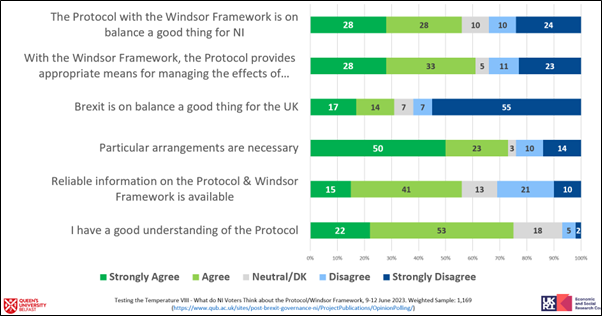
Figure 1. Opinion of Brexit and the Protocol/Windsor Framework[2]
The proportion of respondents who agree or strongly agree that, with the Windsor Framework, the Protocol provides an appropriate means for managing the effects of Brexit for Northern Ireland stands at 61%, higher than the 53-54% in previous polls when the question focused on the Protocol with the grace periods. A majority of respondents (56%) regard the Protocol with the Windsor Framework as ‘on balance, a good thing’ for Northern Ireland. In the five previous polls, 50-53% thought the Protocol was on balance a ‘good thing’ for Northern Ireland. In June 2021, the figure was lower at 43% (see Figure 2). In terms of respondents disagreeing with the proposition, the overall figure of 34% is lower than in the three previous polls in February 2023 (41%), October 2022 (39%) and June 2022 (37%).
In slight contrast, negative views on Brexit itself are, if anything, growing. There continues to be a clear majority (62% – up from 59% in February 2023) who disagree that Brexit is on balance ‘a good thing for the UK’ with 55% currently being strongly of that opinion (the highest level across the polls to date). The proportion of respondents (31%) who agree that Brexit is on balance ‘good’ for the UK is lower than in February 2023 (34%) and October 2022 (32%) and among the lowest figures from polls to date.
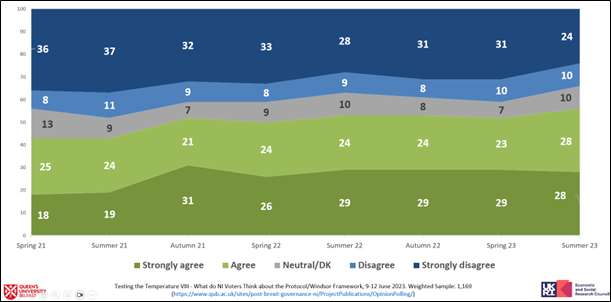
Figure 2. Is the Protocol/Windsor Framework, on balance ‘a good thing’ for Northern Ireland?
Majority acceptance of the Protocol with the Windsor Framework is also reflected in responses to the question on whether the Protocol provides Northern Ireland with a ‘unique set of post-Brexit economic opportunities compared to the rest of the UK which if exploited could benefit Northern Ireland’. More than two-thirds of respondents (68%) agree that there are economic opportunities to be had from the Protocol/Windsor Framework (see Figure 8 below). The figure is the highest it has been since our first poll in March 2021. Almost a quarter of respondents (24%) disagree – a figure just below the lower end of the range in the five previous polls (25-29%) and significantly lower than in June 2021 (34%).
Views on the impact of the Protocol
The poll asked respondents for their assessment of the current impact of the Protocol, now with the Windsor Framework. Important to note here is that grace periods for the application of some of the Protocol’s provisions remain in place and various formalities, checks and controls on the movement of goods into Northern Ireland from Great Britain are either not being implemented or only being implemented partially. The Windsor Framework arrangements are yet to come into force.
Opinions remain divided on the impact of the Protocol (see Figure 3) yet there is evidence of some notable shifts in the light of the adoption of the Windsor Framework suggesting an easing of political tensions and increased acceptance of the Protocol.
As in previous polls, a majority of respondents (54%) see the Protocol impacting negatively on political stability in Northern Ireland. While the figure remains high, it is down on the 59-68% in previous polls, suggesting that the Windsor Framework has had a small moderating influence on the Protocol’s political impact. The results certainly indicate that agreement on the Windsor Framework has produced more positive views as to the Protocol’s impact on British-Irish relations and UK-EU relations. In February 2023, a majority of voters viewed the impact of the Protocol as clearly negative (British-Irish relations – 58%; UK-EU relations – 57%). With the Windsor Framework more voters see the impact as positive (43% and 49% respectively) than negative (35% and 32% respectively).
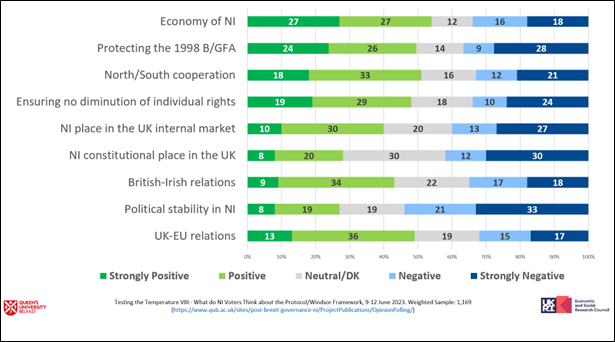
Figure 3. Overall assessment of the current impact of the Protocol/Windsor Framework[3]
The proportion of respondents seeing the Protocol’s current impact as negative on Northern Ireland’s constitutional position in the UK (42%) is lower than in February 2023 (50%) but still only marginally lower than in June 2022 (46%); the proportion seeing the Protocol’s current impact on Northern Ireland’s place in the UK internal market as negative (40%) is also lower than in February 2023 (48%) and October 2022 (47%), and markedly lower than in October 2021 (60%). The figures are reflected in the 41% who agree and the 47% who disagree with the statement: ‘Northern Ireland’s unique position under the Protocol/Windsor Framework poses a threat to its place in the United Kingdom’ (see Figure 9 below). As many voters (40%) currently see the impact of the Protocol with the Windsor Framework on Northern Ireland’s place in the UK internal market as positive. Voters are clearly divided along identity lines: 85% of strongly unionist and 61% of slightly unionist voters view the impact as negative; majorities of ‘slightly nationalist’ (73%), ‘strongly nationalist’ (62%) and ‘neutral’ (54%) voters view the impact as positive.
On the impact of the Protocol on ensuring ‘no diminution’ of individual rights as set out in the 1998 Belfast (Good Friday) Agreement, the gap between those who see the current impact of the Protocol as positive (48%) and those who view the current impact as negative (34%) has widened significantly compared to February 2023 (43% positive to 41% negative) and is closer to the figures in June 2022 (48% positive to 37% negative).
On the question of the impact of the Protocol on the economy of Northern Ireland, just over half of respondents (54%) currently view it as positive (up from 50% in February 2023 and 51% in October 2022 to be almost in line with the 55% in June 2022); 34% view the impact as negative. Agreement on the Windsor Framework has seen a reversal of the decline in the proportion of voters viewing the Protocol as positively protecting the 1998 Agreement. In June 2022 half of respondents (50%) viewed the impact as positive; this fell to 47% in October 2022 and to 44% in February 2023. The figure is now back at 50%, with the proportion of respondents who view the impact as negative falling to 37%.
By February 2023, almost equal proportions of respondents viewed the impact of the Protocol on north-south cooperation as negative and positive. The gap has now widened to 51% positive and 33% negative – wider than a year ago in June 2022 when 49% of respondents viewed the impact as positive and 37% who viewed it as negative.
Written comments expressing positive and negative views
Views expressed in the optional written comments section of the poll were also divided. It is important to note that the reporting of these comments is not weighted to be representative.[4]
Within those expressing negative views of the Protocol/Windsor Framework, most are opposed to it in principle while a smaller proportion oppose its practical implications. Among the comments opposing the Protocol/Windsor Framework in principle were:
“The Windsor Framework and the Protocol are one and the same only worded in a different way. We were told the UK was to leave Europe as one entity. However the English parliament decided to sacrifice Northern Ireland for their own ends.”
“As a Unionist the most important issue is being treated the same as the rest of the UK. Under the Protocol Windsor Framework that is not the case, Northern Ireland is being treated differently and that is not acceptable to me as a Unionist.”
“The Windsor Framework is worse than the Protocol grace period. It was flowered up by Sunak in a feeble attempt to con unionists and have something for the Tory party to boast about before next year’s general election.”
“Try buying a computer battery in England to be posted to Northern Ireland, [it] will not happen under the Protocol. Too many products unable to be posted to Northern Ireland due to Protocol. Absolute disgrace.”
“It’s unbelievable how many online shops won’t deliver to N. Ireland; it makes me feel like a 2nd class citizen. Regarding our MLAs I have little trust or faith in them as they have failed to even attend their jobs whilst ordinary people struggle to make ends meet. Anyone else would be sacked.”
Among those who hold a positive view of the Protocol/Windsor Framework, some see it as a ‘least-worst’ mitigation in the context of Brexit; others see it as potentially beneficial for Northern Ireland if it can be implemented well, this group often links this to the need for political stability; more see the Protocol/Windsor Framework as already beneficial for Northern Ireland.
“We need Stormont back, the Windsor [Framework] Agreement is a great opportunity for prosperity and jobs in Northern Ireland.”
“The Windsor Framework is the best of a bad lot after the UK voting to leave the EU. It gives Northern Ireland a unique position for trading in the UK and the EU…”
“The Windsor Framework is not perfect, but Brexit was never compatible with the Good Friday Agreement, and this is the best mitigation available. It might be improved but only if it gets given a chance.”
Knowledge of the Windsor Framework
In each of our regular Testing the Temperature polls, a clear majority of respondents – generally around three quarters – have indicated that they have a ‘good understanding’ of the Protocol. The same proportion (75%) indicated in our ‘Extra’ poll on in March 2023 that they have a ‘good understanding’ of the Windsor Framework. A similar proportion (73%) indicated as much in this latest poll.
When tested on their knowledge in this poll, respondents were shown to indeed have a generally good level of knowledge of the Windsor Framework (see Figures 4a and 4b – correct answers in green). 74% know that the ‘green lane’ can only be used by ‘trusted traders’; 69% know that will be able to travel with their pets from Great Britain to Northern Ireland on the basis of simplified documentation; 65% know that border control posts are still required in Northern Ireland ports; 80% know that the jurisdiction of the EU’s Court of Justice over the application of EU law has not been removed.
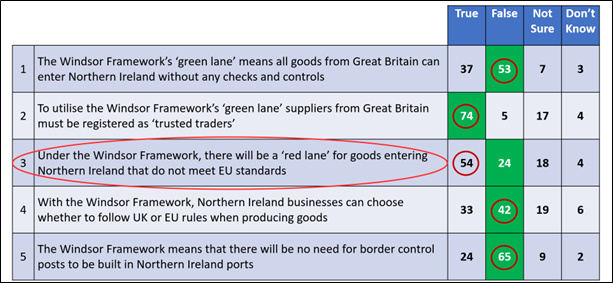
Figure 4a. Knowledge of the Windsor Framework I
The majorities answering correctly on other issues are smaller. Just over half of respondents (53%) correctly responded ‘false’ to the statement that ‘The Windsor Framework’s ‘green lane’ means all goods from Great Britain can enter Northern Ireland without any checks and controls’ (only those moved by registered ‘trusted traders’ can). Exactly half correctly noted that, under the Windsor Framework, medicines can be authorised and placed on the market in Northern Ireland in accordance with UK rules and UK authorisation procedures.
Where people are less sure is in terms of the implementation period for the Windsor Framework (only a third know it runs to Autumn 2025), and on the meaning of the green/red lane – 54% mistakenly answered that there will be a ‘red lane’ for goods entering Northern Ireland that do not meet EU standards (the ‘red lane’ is the short-hand for the procedures to be followed by those who want no doubt that what they are bringing into Northern Ireland meets EU standards and can thus ultimately freely enter the EU market).
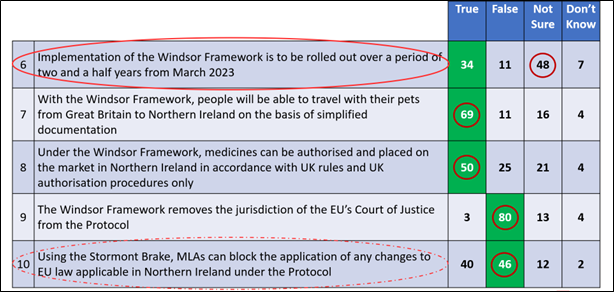
Figure 4b. Knowledge of the Windsor Framework II
Trust to manage the interests of Northern Ireland vis-à-vis the Protocol
Implementation of the Protocol involves a range of actors. As with all previous polls, the only group that is trusted by a majority to manage the interests of Northern Ireland with respect to the Protocol/Windsor Framework are Northern Ireland’s business representatives (55%) (see Figure 5).
Trust in the UK Government when it comes to managing the interests of Northern Ireland with respect to the Protocol/Windsor Framework (4%) is marginally up on the lowest level (3%) recorded in February 2023. The highest level recorded was 7% in October 2022. Four fifths of respondents (80%) continue to distrust the UK Government, down from 85% in February 2023. The largest proportion of respondents distrust it ‘a lot’ (44%), although this is an improvement on the 55% in June 2022.
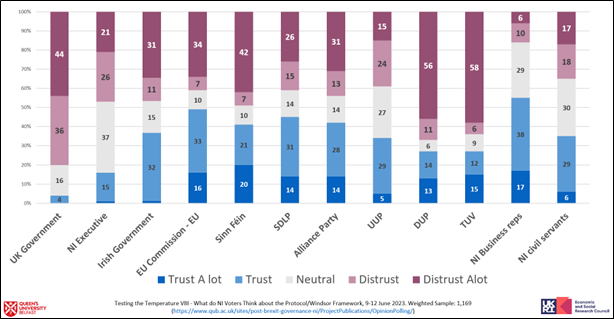
Figure 5. Levels of trust in/distrust of actors to manage the interests of Northern Ireland with respect to the Protocol/Windsor Framework
By contrast, trust to manage the Protocol/Windsor Framework in the interests of Northern Ireland has risen for the European Commission/EU from 44% in February to 49%. Trust in the Irish Government has also improved from 38% in February 2023 to 43%). Distrust in the Irish Government is just as high (42%) but lower than in February 2023 (46%); distrust in the European Commission/EU stands at 41% as it did in February 2023.
Trust in the Northern Ireland Executive to manage the interests of Northern Ireland with respect to the Protocol/Windsor Framework remains strikingly low (16%). Only the UK Government suffers lower levels of trust. Distrust of the Northern Ireland Executive to manage Northern Ireland’s interests stands at 47%. Given the absence of a functioning Northern Ireland Executive, this latest poll inquired into levels of trust/distrust in Northern Ireland civil servants. Respondents were evenly split between trust (35%) and distrust (35%) with slightly fewer respondents (29%) being neutral.
As for the five political parties that formed the last Northern Ireland Executive, the drop in the level of trust in the Alliance Party (from 50% to 42%) noted in October 2023 is confirmed (42%), as it was in February 2023 (44%). It remains, along with the Social Democratic and Labour Party (SDLP) (45%) and now Sinn Féin (41%), one of the three most trusted of the political parties considered here. Distrust in the SDLP has dropped slightly to 41%. Only the Ulster Unionist Party (UUP) is distrusted less (39% compared to 43% in February 2023). Trust in the UUP (34%) has improved (up from 28% in February 2023); almost three-in ten respondents (27%) remain undecided on whether they trust the UUP to manage Northern Ireland’s interests on the Protocol/Windsor Framework. Two thirds of respondents (67%) continue to distrust the DUP, with almost a majority (49%) also distrusting Sinn Féin. In this poll, respondents were also asked to consider the extent to which they trust the Traditional Unionist Voice (TUV) to manage Northern Ireland’s interests on the Protocol/Windsor Framework. A majority (64%) distrust the TUV; 27% trust it.
Written comments on politics and political parties in Northern Ireland
Comments provided by respondents for this poll included some general and specific criticisms of politics in Northern Ireland. There was, however, significant criticism of the DUP, with comments in the optional written responses focusing on the party’s approach to the Protocol/Windsor Framework and its decision not to enter a new Northern Ireland Executive in protest against the Protocol:
“DUP should go back to work now!”
“The DUP need to move on now as we have a better solution in the Windsor Framework.”
“Regardless of the Protocol… DUP need to get to local Assembly.”
Alongside comments directed at the DUP, a similar proportion of submitted comments stated general frustrations with the lack of fully functioning devolved government in Northern Ireland at present:
“Time for the DUP to stop the boycott and get back to solving real issues such as NHS waiting lists, crisis in education, and the cost-of-living crisis. Sick to the teeth with their hypocrisy.”
“The MLAs need to get back into Stormont and make NI work for the benefit of all.”
“Now the negotiations are over, and the deal is done on the Windsor Framework and is being implemented, the Executive should be re-established immediately without delay. Our public services are under huge pressure with budget cuts, and it is unforgivable that the DUP continues to block the Executive and Assembly.”
Views expressed in the comments were divided, however, with a small number also stating support for the DUP’s refusal to enter into an Executive unless the Protocol/Windsor Framework is removed, a view shared by almost a third of voters (see Figure 9 below).
“Until the Windsor Framework is scrapped, the GFA institutions should not be operating.”
Attracting some notable comment was the extent of misinformation around the Protocol/Windsor Framework and the lack of information available on the Protocol and the recent UK-EU discussions. As this and previous polls have indicated, around two in five respondents have concerns about the availability of reliable information on the Protocol (see Figure 1 above).
“There should be more independent clarification and explanations of the Protocol/Framework. At the moment politicians can just twist things to suit their own agenda and they are believed. There really needs to be more simple explanations at a lower level because it’s just a Green/Orange issue at the moment.”
“Not enough information or discussion about the impact of the Protocol. The media have taken no interest in investigating this and informing the public.”
Also, various respondents expressed exasperation at the fact that the Protocol was still an issue and at the state of politics in Northern Ireland more generally.
“Fed up with the whole sorry scenario.”
“Feeling completely demoralised over politics here and the lack of Executive. It feels as though we have been abandoned due to DUP stance in this instance and Sinn Féin in previous instance. Does nobody really care about the people here beyond their green or orange ideology.”
“I have to a large extent given up hope of there being enough politicians with integrity either in NI or on the mainland that I have really stopped even trying to keep up with it all…”
Democratic consent and MLAs
The future of core provisions of the Protocol/Windsor Framework – those relating to the movement of goods and the single electricity market (i.e. Articles 5-10) – is subject to the democratic consent of MLAs in a vote that is to be held up to every four years. MLAs will first vote in November/December 2024.
Most respondents (94%) have a view on how they wish their MLAs to vote: 58% in favour of the continued application of Articles 5-10 and 36% against (see Figure 6). These figures are a change compared to the four previous regular Testing the Temperature polls and reveal a widening of the gap in views that has emerged since the June 2021 poll when voters were split almost evenly (46% in favour and 45% against). The gap has, however, narrowed since the ‘Extra’ Testing the Temperature poll on the Windsor Framework conducted in March 2023 shortly after its adoption.
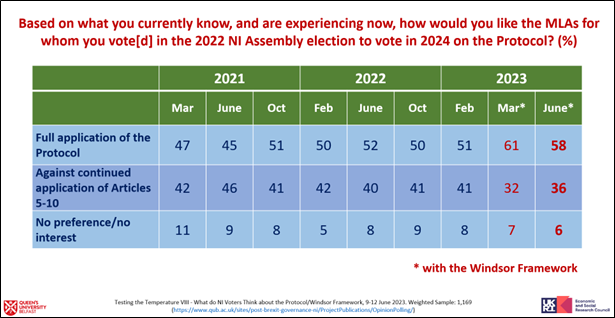
Figure 6. Democratic Consent Vote 2024
As in most previous polls we asked how a candidate’s position on the Protocol might affect a respondent’s willingness to vote for them. If there were an election to the Northern Ireland Assembly in the next four months, the position of a candidate would be a factor for more than four fifths of respondents (86%). Of these, just under a third would vote for candidates either opposed to consent in 2024 (11%) or wanting to see the Protocol scrapped (21%) (see Figure 7). This has been barely any movement since February 2023, when the figures were 12% and 22% respectively (and 8% and 23% in the ’Extra’ poll in March 2023). This suggests that, despite the ‘warming of views’ in some quarters since the Windsor Framework, those who were clearly against the continuation of Articles 5-10 before remain of that opinion.
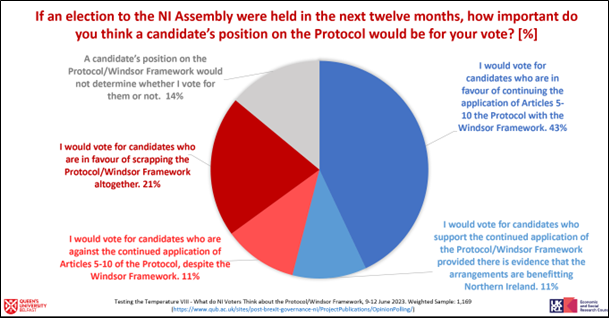
Figure 7. Democratic Consent in 2024… and the Next NI Assembly Election
In terms of support for consent in 2024, more than two-in-five respondents (43%) would vote for candidates in favour of the continued application of the Protocol/Windsor Framework. This is up from 36% in February 2023, with the proportion rising to more than half (52%) if there is evidence that the Protocol/Windsor Framework is seen to be benefitting Northern Ireland. The largest shift from pre-Windsor Framework appears, then, to have come from among those who were previously saying a candidate’s position on the Protocol would not determine their vote (14% down from 18% in February 2023).
Public opinion on the Windsor Framework, Brexit and what might come next
The final section of the poll involved two sets of questions each asking respondents whether they agreed or disagreed with specific statements. The first set (see Figure 8) involved questions relating to the Windsor Framework. It included a question asked in each of the previous regular Testing the Temperature polls: whether the Protocol, this time with the Windsor Framework, provides Northern Ireland with ‘a unique set of post-Brexit economic opportunities compared to the rest of the United Kingdom which if exploited could benefit Northern Ireland’. As already noted, more than two-thirds of respondents (68%) agree; almost a quarter (24%) disagree. This is a markedly larger gap in responses compared to the February 2023 poll (when 62% agreed and 29% disagreed).
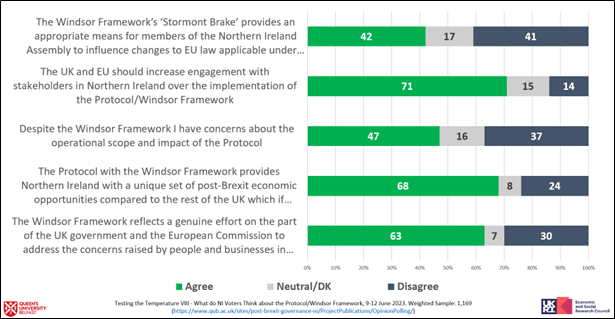
Figure 8. Attitudes towards the Windsor Framework (%)
The change reflects a warming of some unionist voters towards the Protocol with the Windsor Framework. Notable is that a majority (59%) of ‘slightly unionist’ respondents now view the Protocol as providing a unique set of opportunities that could benefit Northern Ireland.
Further questions included whether the Windsor Framework reflects a genuine effort on the part of the UK Government and the European Commission to address the concerns raised by people and businesses in Northern Ireland about the Protocol. Most respondents (63%) agree, but almost a third (30%) disagree, slightly up on the 26% in the ‘Extra’ poll in March 2023. On whether voters, despite the Windsor Framework, have concerns about the operational scope and impact of the Protocol, almost half (47%) agree while more than a third (37%) disagree. In the three previous pre-Windsor Framework polls, 55-58% of respondents indicated concerns.
On questions of Northern Ireland’s voice being heard in the implementation of the Protocol/Windsor Framework, a clear majority (71%) would welcome increased UK-EU engagement with stakeholders in Northern Ireland. Striking in the breakdown of the responses is the shift in support for stakeholder engagement from among ‘strongly unionist’ (62%) and Leave respondents (65%). There is little difference between ‘slightly unionist’ (79%), ‘slightly nationalist’ (76%) and ‘neither’ (82%) respondents in their wish to see UK-EU stakeholder engagement in Northern Ireland; strong nationalists are in between at 70%. Respondents are more divided on the value of the Stormont Brake. In fact, they are almost evenly split – 42% agree and 41% disagree – on whether the Stormont Brake provides an appropriate means for MLAs to influence changes to Protocol-applicable EU law.
The second set of questions considered views on Brexit, devolved government and the future of UK-EU relations (See Figure 9). On Brexit, 62% of respondents agreed that the UK was wrong to leave the EU. The question was inspired by the 2023 UnHerd poll that estimated that in every constituency in Great Britain except three, more people agree with the statement than disagree.
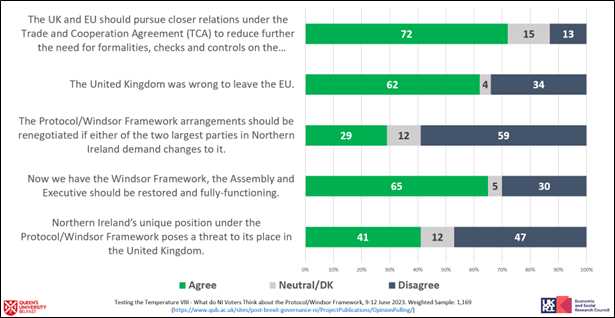
Figure 9. Brexit, Devolved Government. and the future of UK-EU relations
As for the future, almost three quarters of respondents (72%) indicated they wished to see the UK and EU pursue closer relations to reduce further the need for formalities, checks and controls, recognition of the fact that how goods move between Great Britain and Northern Ireland is as much a consequence of the wider UK-EU trading relationship as it is the Protocol/Windsor Framework. Notably, a clear majority of those identifying as ‘strongly unionist’ (65%) and ‘slightly unionist’ (73%) want to see the UK and EU pursue closer relations.
On power-sharing, a clear majority overall (65%) are of the view that the Northern Ireland Executive and Assembly should be ‘fully functioning’ now that the Protocol/Windsor Framework has been agreed. Just under a third of respondents (30%) – predominantly voters identifying as ‘strongly unionist’ disagree. There has been little change in views on whether an agreement on addressing issues concerning on the Protocol should lead to a return of devolved government in Northern Ireland. In October 2022, 65% agreed and 32% disagreed.
Finally on whether the Protocol/Windsor Framework should be renegotiated if either of the two largest parties in Northern Ireland demand changes to it, most voters (59%) disagreed; 29% agreed. The split here fell between strongly unionist respondents who agreed (67%) and others, suggesting that this is one power sought by the DUP that Sinn Féin supporters do not wish to see their party hold too.
The report is available to download here:
